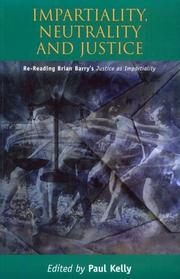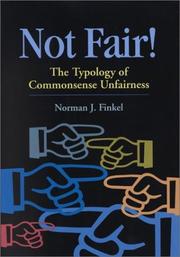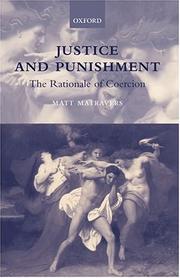| Listing 1 - 10 of 427 | << page >> |
Sort by
|

ISBN: 0754612988 Year: 2000 Publisher: Aldershot Ashgate
Abstract | Keywords | Export | Availability | Bookmark
 Loading...
Loading...Choose an application
- Reference Manager
- EndNote
- RefWorks (Direct export to RefWorks)
Book
ISBN: 1474469736 Year: 2000 Publisher: Edinburgh : Edinburgh University Press,
Abstract | Keywords | Export | Availability | Bookmark
 Loading...
Loading...Choose an application
- Reference Manager
- EndNote
- RefWorks (Direct export to RefWorks)
Brian Barry's Justice as Impartiality confronts issues at the heart of modern political philosophy. This important collection examines various aspects of his argument and expands the discussion beyond the text to explore wider issues at the centre of contemporary debates about the nature and theories of distributive justice. It brings together responses from a wide range of Barry's critics including feminists, utilitarians, mutual advantage theorists, care theorists and anti-contractarians.Suitable for both undergraduates and academics working in political and legal theory, this text serves as an ideal companion volume to Barry's work. The expansion of each contributor's focus beyond the issues raised by Barry means this text also stands as a contribution to political thought in its own right.Key FeaturesPaperback edition published to meet demand for this book from lecturers teaching political philosophy, ethics, and justice coursesIncludes detailed response to his critics from Brian BarryFeatures contributions from leading international figures in the field including Richard Arneson, David Gauthier, Russell Hardin, Susan Mendus and Albert WealeServes both as a companion to Barry's Justice as Impartiality and as a new contribution to political thoughtOffers an important reply to Barry by David Gauthier in which he defends his mutual advantage theory of morality

ISBN: 0748614532 Year: 2000 Publisher: Edinburgh Edinburgh university press
Abstract | Keywords | Export | Availability | Bookmark
 Loading...
Loading...Choose an application
- Reference Manager
- EndNote
- RefWorks (Direct export to RefWorks)

ISBN: 1566395925 Year: 1998 Publisher: Philadelphia Temple University Press
Abstract | Keywords | Export | Availability | Bookmark
 Loading...
Loading...Choose an application
- Reference Manager
- EndNote
- RefWorks (Direct export to RefWorks)
Book
ISBN: 0198892896 0198892888 0191996904 Year: 2024 Publisher: Oxford, England : Oxford University Press,
Abstract | Keywords | Export | Availability | Bookmark
 Loading...
Loading...Choose an application
- Reference Manager
- EndNote
- RefWorks (Direct export to RefWorks)
What is Structural Injustice? is the first edited collection to bring together the voices of leading structural injustice scholars to provide an overview of this profoundly important concept.

ISBN: 1557987521 Year: 2001 Publisher: Washington, DC : American Psychological Association,
Abstract | Keywords | Export | Availability | Bookmark
 Loading...
Loading...Choose an application
- Reference Manager
- EndNote
- RefWorks (Direct export to RefWorks)
Fairness. --- Fairness --- Ethics --- Philosophy --- Philosophy & Religion

ISBN: 9780198295730 0198295731 Year: 2000 Publisher: Oxford: Oxford university press,
Abstract | Keywords | Export | Availability | Bookmark
 Loading...
Loading...Choose an application
- Reference Manager
- EndNote
- RefWorks (Direct export to RefWorks)
Punishment --- Fairness. --- Justice
Book
ISBN: 9780847677191 0847677192 Year: 1992 Publisher: Lanham (Md.): Rowman & Littlefield,
Abstract | Keywords | Export | Availability | Bookmark
 Loading...
Loading...Choose an application
- Reference Manager
- EndNote
- RefWorks (Direct export to RefWorks)

ISBN: 040511771X Year: 1979 Publisher: New York (N.Y.) : Arno press,
Abstract | Keywords | Export | Availability | Bookmark
 Loading...
Loading...Choose an application
- Reference Manager
- EndNote
- RefWorks (Direct export to RefWorks)
Book
Year: 2017 Publisher: Washington, D.C. : The World Bank,
Abstract | Keywords | Export | Availability | Bookmark
 Loading...
Loading...Choose an application
- Reference Manager
- EndNote
- RefWorks (Direct export to RefWorks)
This paper explores perceptions of distributive justice in Latin America during the 2000s and their relationship with income inequality. In line with the fall in income inequality in the region, the paper documents a widespread, although modest, decrease in the share of the population that believes income distribution is unfair. The fall in the perception of unfairness holds across very heterogeneous groups of the population. Moreover, perceptions evolved in the same direction as income inequality for 17 of the 18 countries for which microdata are available. The analysis reveals that unfairness perceptions are more correlated with relative measures of income inequality than absolute ones, and that individual characteristics are correlated with distributive perceptions. On average, individuals who are older, more educated, unemployed, and left-wing tend to perceive income distribution as more unfair. The paper shows that the decrease in unfairness perceptions during the past decade was due to changes in inequality, rather than to composition effects. Finally, the paper shows that individuals who perceive income distribution as very unfair are more prone to mobilize and protest.
Distributive Justice --- Fairness --- Inequality --- Perceptions
| Listing 1 - 10 of 427 | << page >> |
Sort by
|

 Search
Search Feedback
Feedback About UniCat
About UniCat  Help
Help News
News